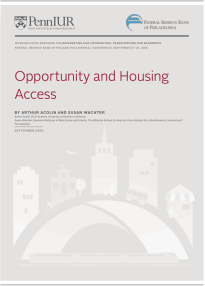Key Message
To promote inclusive economic growth and enhance social mobility, it is crucial to address the barriers to housing affordability and access to high-opportunity areas. Key policy recommendations include expanding housing vouchers, implementing ZIP-code-based rent ceilings, and increasing investment in affordable housing in high-growth regions. Additionally, fostering local and regional initiatives that integrate economic development, education, and housing policies can create more equitable access to opportunities. By ensuring that lower-income households can afford to live in areas with abundant job opportunities and amenities, these measures can help reduce economic disparities and support sustainable, inclusive growth


